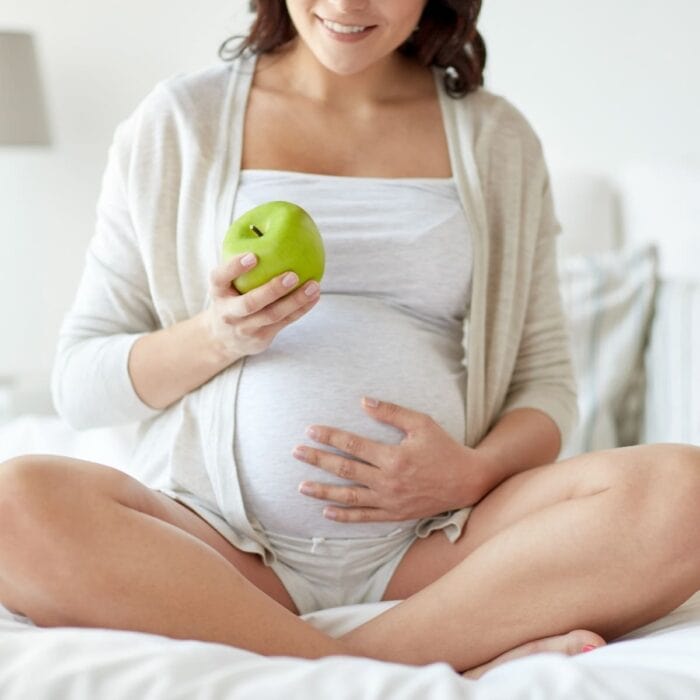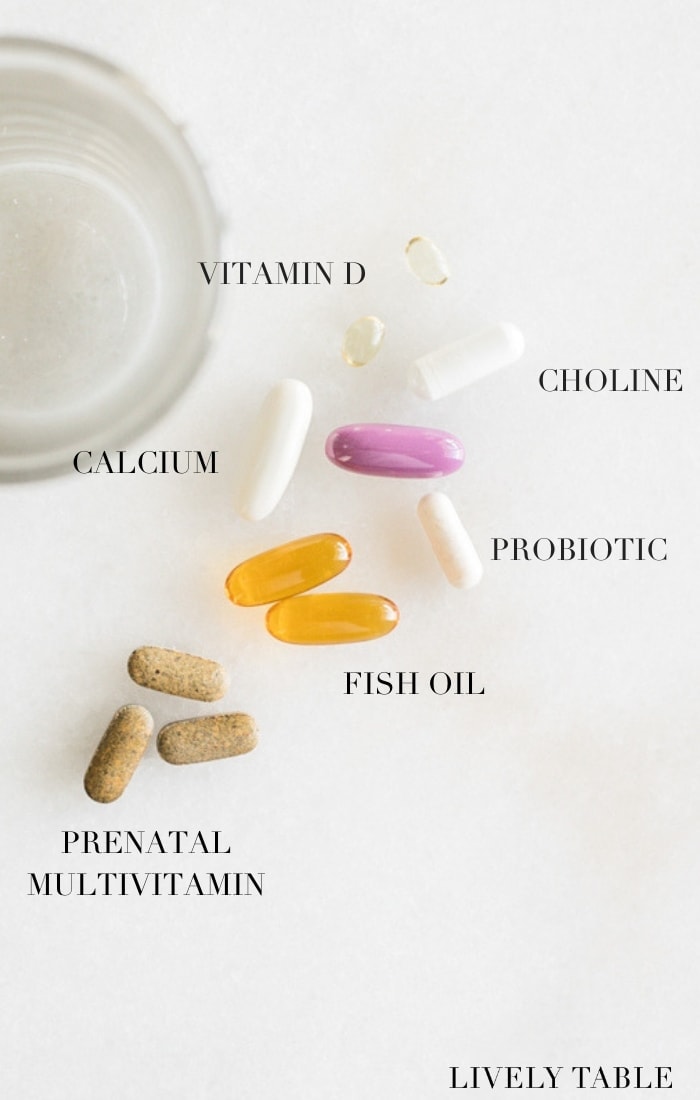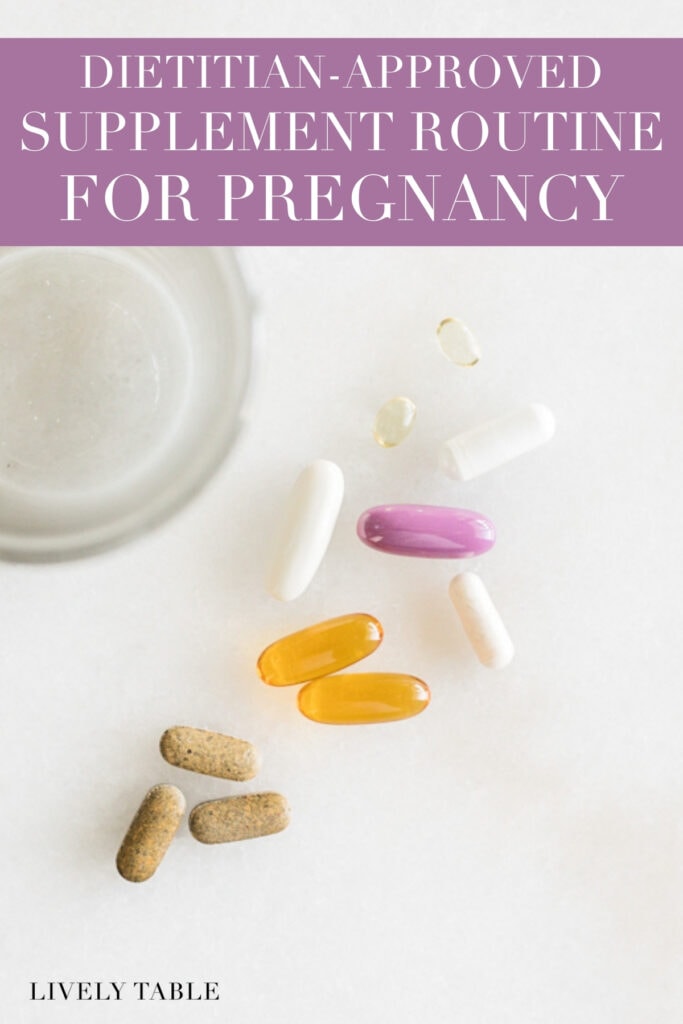Are supplements necessary during pregnancy, or should you be getting nutrients from food? Here is a peek at my RD-approved pregnancy supplement routine.

Pregnancy is such a special time when your body goes through so much trying to build a little human life. Now that I'm on my second (that still sounds crazy!), I've been getting questions about things like supplements and dietary restrictions in pregnancy. I tend to take for granted that nutrition comes as second nature to me due to my background, and that it might be much more stressful for some women trying to figure out what to do, eat, and take during pregnancy. One common question I get:
Do you need supplements during pregnancy?
Like most dietitians, I take a food-first approach, meaning I prefer to get nutrients from the food I eat rather than from supplements, and I recommend others do the same. However, I realize there are gaps in a lot of people's diets. On top of that, pregnancy puts a lot of demands on the body and requires a lot of extra nutrition, so just food may not cut it, especially in the first trimester when the thought of anything besides dry toast may make your stomach churn.
Finally, there are a lot of unique and increased nutrient needs during pregnancy that are just really hard to get from food, like folate and iron, that are really important for baby's growth and development. So yes, a prenatal vitamin at the very least is important during pregnancy.
Here's a peek at my pregnancy supplement routine:

Prenatal multivitamin
A prenatal vitamin is a must for mamas-to-be. Prenatals contain folate (or folic acid), which is important for preventing neural tube defects (it's important to get enough folate even if you're planning on becoming pregnant), iron, which helps prevent anemia, low birth weight, and premature delivery, and calcium, as well as other important vitamins and minerals1. I take New Chapter Perfect Prenatal because it's one of the few prenatal vitamins with methylated folate (the activated form), which my doctor recommended I take to help with anxiety.
Fish oil
DHA, an omega-3 fatty acid found in seafood, is a critical nutrient for a baby's brain development. Research shows that omega-3's could also help prevent preterm birth and postpartum depression in mothers2. Since most people don't eat enough seafood, a supplement is probably a good idea during pregnancy. You can get prenatal vitamins that contain DHA, or you can take a separate fish oil supplement.
Choline
Choline is a little-known nutrient that is important for early brain development in pregnancy and infancy. 90% of Americans, including pregnant women, don’t get near enough, and most prenatal vitamins don't contain choline, despite the American Medical Association's recommendation to include it3. I try to include eggs (the main dietary source of choline) in my daily routine, but I take a choline supplement just in case.
Magnesium
Pregnancy has a way of, um, stopping you up, partly due to all that iron in prenatal vitamins. A magnesium supplement helps move things along when the prunes just don't cut it.
Calcium and Vitamin D
Pregnant or not, I pretty much always take calcium and vitamin D. Together (along with magnesium!), they're important for bone health. But I also take vitamin D for its possible effect on depression4. Both calcium and vitamin D are important for the baby's development, so getting adequate amounts is important5.
Probiotic
I take a daily probiotic all the time to keep me regular and because I'm annoyingly prone to yeast infections. So the probiotic continues during pregnancy.
While supplements certainly don't replace a healthy, balanced diet, the supplements above help me fill in the gaps where my diet may fall short. If you're considering supplements during your pregnancy, make sure you talk with your doctor about them and get the OK! Everyone's needs are different, so just because these are the supplements I take, doesn't necessarily mean that you should have the same routine.
Resources:
- https://www.ncbi.nlm.nih.gov/pmc/articles/PMC3250974/
- https://www.ncbi.nlm.nih.gov/pmc/articles/PMC3046737/
- https://www.eggnutritioncenter.org/articles/ama-recommendations-highlight-importance-choline-pregnancy/
- https://www.ncbi.nlm.nih.gov/pmc/articles/PMC2908269/
- https://www.ncbi.nlm.nih.gov/pmc/articles/PMC3347028/



Molly says
It would be helpful if you could say how much of each you take/recommend.
Hari says
Hello Kaleigh, pls recommend a good choline supplement and the dosage. as my wife takes DHA supplement (720 mg), combining that am bit confused of Choline dossge.
thanks,
Hari
Kaleigh says
Hi Hari,
Congrats to you and your wife! It can be hard to find choline supplements in stores. Sprouts or another health food store is probably your best bet. I currently take the Solaray 300mg because that's what's available where I live. The recommended intake for choline is 450 mg/day for pregnancy and 550 mg/day for nursing.